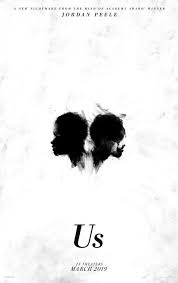Many have declared that writer-director Jordan Peele's latest film Us has broken through the "sophomore slump" that has (ahem) plagued so many feature film directors. His 2017 directorial debut Get Out (about an African-American man who visits with his Caucasian girlfriend's family one weekend and discovers a sinister cover-up) was, after all, both a critical and commercial success. It became the first horror film to earn a Best Picture Oscar nomination since 2010 (when Darren Aronovsky's Black Swan was nominated), and even won Peele an award for his original screenplay.
But if Get Out was a commentary on race relations and dark realities in contemporary America, then Us transcends that beyond not only an African-American family at the center, but also, perhaps, to the dark side of human nature and psychology. The basic premise of Us involves a family that goes on vacation to a lake house, only to be terrorized by a group of red-jumpsuit-wearing dopplegangers, known as the Tethered.
Peele had his cast (including Lupita N'Yongo, Winston Duke, and Elisabeth Moss) watch several different horror films prior to principle photography, including The Birds (1963), It Follows (2014), The SIxth Sense (1999), and The Shining (1980), to get a feeling of the overall tone for this film. And if you've seen any ads or previews for Us, you'll likely agree there are many frightening, nightmarish, jarring, and esoteric elements that send shivers down your spine: a creepy, trench-coated figure standing on the beach, blood dripping from its fingers. Mysterious people standing in a driveway, making clicking sounds. Scissors. Underground tunnels, like something out of a Kubrick film. A throwback to the "Hands Across America" event from the 1980s. A little boy in a werewolf mask snapping his fingers. A hall of mirrors (and you know it's going to get crazy here). Caged rabbits in what looks like a classroom (set to a haunting opening credits chant). And a haunting rendition of Luniz's drug ballad "I Got 5 On It".
N'Yongo has been building a stellar career for the last half-decade, playing broken or empowering female characters, whether as slave Patsy in 12 Years a Slave, alien Maz Kanata in the current Star Wars films, or as fierce warrior Nakia in Black Panther. She's now officially added "scream queen" to her resume, following in the footsteps of Janet Leigh, Jamie Lee Curtis and Heather Langenkamp before her. You'll never think of her the same way again after seeing the duality of panicked mother Adelaide (who suffered a traumatic event as a child) coming up against her frightening and crazed doppleganger. The image of this character on the film's poster alone is one of the scariest I've ever seen.
To be sure, Us (like Get Out) is brilliantly-made and effectively-scary. It's also both a psychological horror film (e.g., home invasion thriller), as well as a slasher film (with many bloody results). And with that in mind, I can't help but ponder Peele's intent here.
Do the Tethered represent our own worst enemies or our own worst fears? What of the widespread pandemic (or apocalypse?) that impends, ditto the "Hands Across America" imagery?
Is the overall message here an eye-opener to humanity's cynicism and ignorance (courtesy an implied governmental experiment gone wrong), or is the message just a fleeting and nihilistic one? Likewise, is Jeremiah 11:11 (and therefore God) misused here for the latter worldview, and lacking redemption?
Whatever interpretation, Peele (who recently revived The Twilight Zone, and will be producing an upcoming remake of Candyman) assures how intuitive a filmmaker he is, especially with what he does in the horror genre and the various commentaries he incorporates into it, much like preceding stories involving shark attacks, ax-wielding, homicidal novelist; and packs of birds. Us proves equally thrilling, ambitious, ambiguous, and provocative.







No comments:
Post a Comment